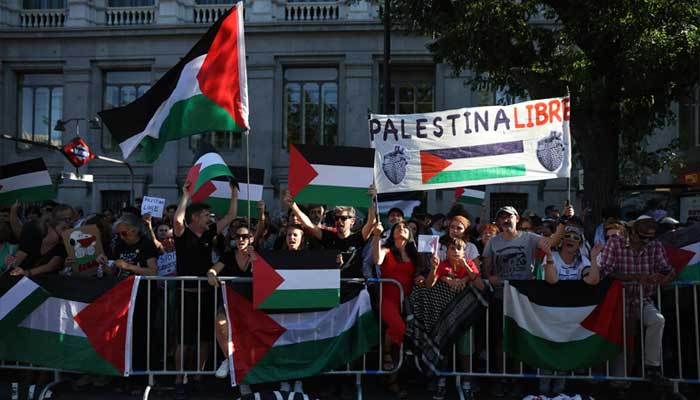Select Language:
Pro Palestine protesters carrying flags and banners gathered during a demonstration in Madrid, Spain, on September 14, 2025. –Reuters
Britain, Australia, Canada, and Portugal announced on Sunday they have officially recognized a Palestinian state following nearly two years of conflict in Gaza. Meanwhile, France, Belgium, and other nations are preparing to follow suit at the UN General Assembly.
Currently, only about 75% of United Nations member states recognize Palestine as a state. An AFP count shows at least 145 countries out of 193 UN members have extended recognition. However, recent confirmations from three African nations are still pending.
This recognition list includes the UK and Canada—the first G7 countries to do so—along with Australia and Portugal. During a summit at the United Nations headquarters in New York, chaired by France and Saudi Arabia, several countries such as France, Belgium, Luxembourg, and Malta are expected to follow suit.
Recognition largely spans across Russia, most Arab nations, nearly all African and Latin American countries, and numerous Asian countries like India and China. The first country to officially recognize a Palestinian state was Algeria on November 15, 1988, shortly after Yasser Arafat, then leader of the Palestine Liberation Organization (PLO), declared independence unilaterally.
In the weeks and months that followed, dozens more nations recognized Palestine. A second wave of recognitions occurred between late 2010 and early 2011. The recent escalation of violence in Gaza has prompted an additional 13 countries to acknowledge Palestine.
On the other hand, over 45 countries do not recognize Palestine. This group includes Israel, the United States, and their allies. Israeli Prime Minister Benjamin Netanyahu’s government firmly rejects the idea of a Palestinian state. Countries like Japan, South Korea, Singapore, Cameroon, Panama, and most nations in Oceania also do not recognize Palestine.
Europe remains highly divided on this issue, split nearly evenly in support and opposition. Until the mid-2010s, only Turkey and countries from the former Soviet bloc recognized Palestine, but that trend has shifted over recent years. Some former Eastern European nations, such as Hungary and the Czech Republic, now do not recognize Palestine bilaterally. Western and northern Europe, once united in non-recognition, have seen several countries like Norway, Spain, Ireland, and Slovenia recognize Palestine in 2024, with the UK and Portugal doing so this past Sunday. Italy and Germany have expressed no plans to follow suit.
Recognition signifies a country’s acknowledgment of Palestinian statehood but does not automatically establish a new state in legal terms. According to Professor Romain Le Boeuf of the University of Aix-Marseille, recognition is a complex issue that sits somewhere between political choice and legal status. Countries can recognize Palestine at different times and ways, often without formal documentation. The Palestinian Authority maintains its own list of recognitions; other states may claim recognition without explicitly declaring it.
International law clarifies that recognition does not directly create a state nor prevent the existence of one in the absence of recognition. However, gaining widespread recognition is seen as a symbolic and political milestone. About three-quarters of countries believe Palestine fulfills the necessary conditions to be considered a state. As Philippe Sands, a lawyer and law professor, noted in the New York Times, recognizing Palestinian statehood elevates their status under international law, putting Palestine and Israel on equal legal footing.






